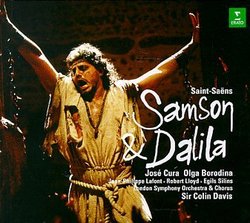| All Artists: Camille Saint-Saens, Sir Colin Davis, José Cura, Olga Borodina, London Symphony Orchestra & Chorus Title: Saint-SaŽns - Samson & Dalila / Cura, Borodina, Lafont, Lloyd, Silins, Sir Colin Davis Members Wishing: 0 Total Copies: 0 Label: Elektra / Wea Release Date: 11/3/1998 Genre: Classical Style: Opera & Classical Vocal Number of Discs: 2 SwapaCD Credits: 2 UPC: 639842475624 |
Search - Camille Saint-Saens, Sir Colin Davis, José Cura :: Saint-SaŽns - Samson & Dalila / Cura, Borodina, Lafont, Lloyd, Silins, Sir Colin Davis
 | Camille Saint-Saens, Sir Colin Davis, José Cura Saint-SaŽns - Samson & Dalila / Cura, Borodina, Lafont, Lloyd, Silins, Sir Colin Davis Genre: Classical
Samson et Dalila is having a renaissance, and not because it's great music. Though there are patches of seductive stuff, the opera is being pressed into service for the growing number of acclaimed mezzo-sopranos, since the... more » |
Larger Image |
CD DetailsSynopsis
Amazon.com Samson et Dalila is having a renaissance, and not because it's great music. Though there are patches of seductive stuff, the opera is being pressed into service for the growing number of acclaimed mezzo-sopranos, since the role of Dalila is one of the few 19th-century star vehicles for that voice type. This recording boasts the vocally resplendent Russian mezzo Olga Borodina, but tenor Jose Cura is the dominant presence, heard here in his strongest operatic recording yet. While his voice has been known to go slack at lower volumes, he seems uniformly secure. His characterization also has all the necessary heroism, along with thoughtful, touching pianissimos after Samson loses his strength. Borodina isn't as electrifying here as in her live Metropolitan Opera telecast (she's often too careful in the recording studio) but is often close to ideal. Minor roles are vocally patchy. But conductor Colin Davis, the real star of the set, gives this opera the same shimmering aura of his great Berlioz interpretations, as if this were a poor man's Les Troyens. Shimmer comes courtesy of the fine London Symphony Orchestra and the slightly-too-reverberant recording venue, Walthamstow Assembly Hall. --David Patrick Stearns Similar CDs
|
CD ReviewsWonderfully Sung Samson Mary Neuhoff | Los Angeles, CA USA | 06/19/1999 (5 out of 5 stars) "Jose Cura's powerfully portrayed, many-hued Samson has pushed this opera back up to a high rank among my favorites. Yes, folks, you indeed could hear his softer passages in Turin and Washington just like they're sung here. Olga Borodina's performance is lush, if one-dimensional--such a gorgeous voice! The other singers and the chorus are fine, the orchestra under Sir Colin Davis bright and crisp. But just Cura alone is worth the price of the set." A recording that has to be in any collection. William Thon | Granada Hills, CA USA | 10/11/1999 (5 out of 5 stars) "Many of the recordings of Samson have been made with weak orchestra backing. Finally Sir Colin has given us the proper recording this great work deserves. Song Thirteen on disk two is perfection. As well as being one of the greatest instrumental parts ever written. Jose's voice is splendid." Terrific character casting of voices. Mary Neuhoff | 05/10/1999 (5 out of 5 stars) "Miss Borodina not only possesses a lush voice, but fulfills the dramatic requirement of convincing Samson of her sincerity, while of course being his political enemy and betrayer. Mr. Cura is able to convey with his voice alone the many sides of Samson: hero and leader, lover, wounded soul, and strong in his faith at the end. So, until there's a video to review, these leads offer an exicitng audio portrayal."
|

 Track Listings (13) - Disc #1
Track Listings (13) - Disc #1
